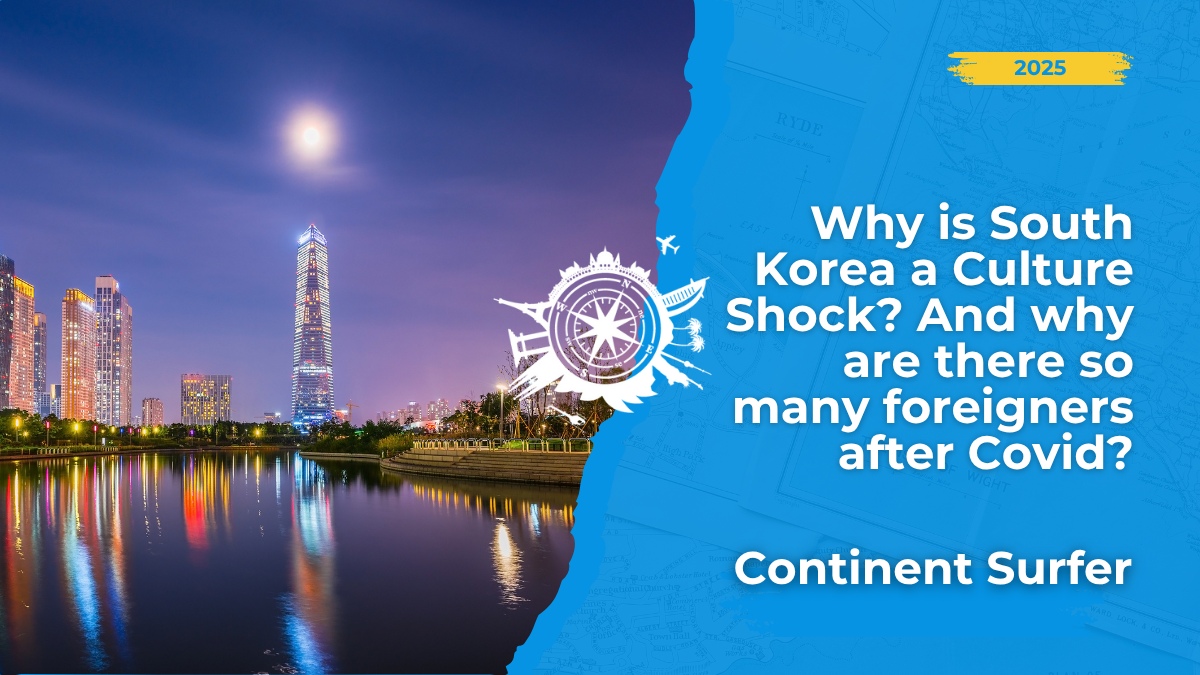Why is South Korea a Culture Shock? And why are there so many foreigners after Covid?
When someone arrives in South Korea for the first time, they will very likely feel as if they’ve stepped onto the set of a TV series. Seoul at night is like the brightly lit streets of “Itaewon Class,” and by day it is simultaneously super-modern and traditional. But what is truly astonishing is the difference awaiting us there compared to our own daily lives. This is what’s called culture shock. And why has this become such a big topic now? Simply put: the number of foreigners in the country has skyrocketed since Covid.
written by: Rodebert – Continent Surfer
Why does culture shock hit so hard in South Korea?
Culture shock is when someone is suddenly confronted with the customs and rules of another culture that they don’t understand, causing them to feel uncomfortable. In Korea, this is particularly intense because everything is highly disciplined and often intense: the forms of showing respect (for example, how they bow or address someone), the workplace hierarchy where the boss’s word is law, or even a dinner where you don’t decide when to raise your glass, but the oldest person does. If you watch the series “Start-Up” or “Misaeng,” you get a precise feeling of what a Korean workplace can be like: simultaneously inspiring and overwhelming, full of unwritten rules.

Why the sudden influx of foreigners?
- The Influence of K-Pop and K-Dramas: BTS, Blackpink, Squid Game, Crash Landing on You—these names have brought not just fan bases, but also tourism. Many simply wanted to see the locations they grew to love on screen.
- Study and Work: Korean universities offer more and more scholarships to foreigners, and the economy is absorbing many experts. IT, cosmetics, and the automotive industry are all open to foreigners.
- The Effect of Covid: During the lockdowns, many people discovered Korean culture online. They binge-watched series, listened to K-Pop, and cooked Korean food at home. As soon as travel was possible again, many felt a “now or neve”” urge, and their first trip led them to Korea.

The biggest shocks foreigners face:
- Workplace culture: Long working hours, respect for the boss, and the hierarchy seen in “Misae”g” are not fiction.
- Table etiquette: It is improper to start eating before the eldest person, and drinking must also follow specific rules.
- Lack of direct speech: Conflict is avoided, so you may not get a direct answer.
- Hyper-modern everyday life: Everything works with QR codes and apps, which can be shocking initially for those unaccustomed to it. It’s like stepping from a scene in “Reply 1988” (family traditions) right into “Vincenzo” (hyper-tech, skyscrapers, luxury offices).

How to survive culture shock?
- Language: A few basic expressions (greetings, courtesy) help immensely.
- Expat community: In Seoul, there are language exchanges or expat meet-ups almost every week.
- Openness: Differences should not be taken as an attack.
- Local experiences: Try kimchi, go to a temple festival, or sit down at a noraebang (karaoke).

The Future: Opening Up or Building Walls?
South Korea is slowly but surely opening up to the world. Seeing many foreigners is normal in the big cities, but people in smaller towns are still surprised to see a stranger. In the long run, it is likely that society will become more inclusive, but traditional rules will also remain. South Korea is a place where you can truly experience both the past and the future at the same time. After Covid, many decided to experience this world live—a world they previously only knew from series and music. Culture shock will certainly hit in the first few days, but if one is open and willing to adapt, they can easily feel like the main character in their own K-drama.
Did you know?
Fruit is considered a lavish and quality gift in South Korea, symbolising generosity and goodwill, as fruits are very expensive in the country.

Like what we do?
If so, please support us, every little counts and is much appreciated!
You will help us to come up with useful information regularly, so please support us every once and a while or even monthly! Thank you!
Source(s):
Original article
Join the Continent Surfer community!
Subscribe to our newsletter and be the first to receive the latest news, useful tips, and exclusive offers!
Comment

